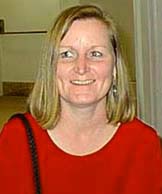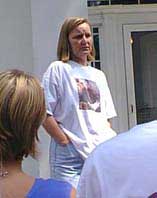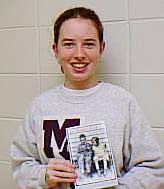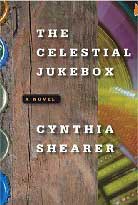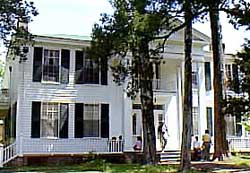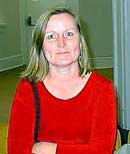Major Works
- The Celestial Jukebox (2004)
- The Wonder Book of the Air (1996)
Cynthia Shearer: A Biography
by Kathryn Herring (SHS) 1997
Cynthia Shearer was born on June 25, 1955, on Westover Air Force Base in Massachusetts. Her parents returned to their hometown of Alapaha, Georgia, shortly after Shearer was born and she grew up there. Her mother was a high school English teacher. Her father, Irvine Harrison Shearer, was an alcoholic, so her parents divorced when she was three. Interested in writing from childhood, she kept a daily journal. Shearer describes herself as a loner who “worked at not fitting in.” Music was a major influence in her life, and her older brothers contributed to that interest by giving her their old records, such as the Beatles and anti-war music. Shearer was a serious girl in high school and strongly opposed the Vietnam War.
She went to college in Valdosta. In 1980, Shearer moved to Oxford, Mississippi, where she was strongly influenced by Mississippi writer Barry Hannah. She earned an M.A. in English from the University of Mississippi. She was married to Stanley Godbold for a time, but they later divorced. She met her current husband in grad school when he (Dan Williams) had come to Ole Miss from Germany to teach. She began to write seriously at the age of thirty when she was finishing her Ph. D. Her goal was to make a difference in the world with her writing and to write things people actually care about reading. She and her second husband Dan Williams, chairman of the English department at Ole Miss, had a daughter in 1987.
In 1994, Shearer became the curator of Rowan Oak, the home of the writer William Faulkner. and kept the position for six years. She gave up the position to have more time to teach English and to have more time for her writing. Her first novel, The Wonder Book of the Air, was published in 1996 after four years in the making. She admits that it is semi-autobiographical.
In 2004 Cynthia Shearer published The Celestial Jukebox. She and her husband Dan Williams now live in Fort Worth, Texas, where Shearer teaches creative writing at TCU in Fort Worth and Dan chairs the English Department.
Interview with Cynthia Shearer1997
by Tamra Blocker (SHS)
Dear Tamra:
Thanks for the list of questions. I’ll try to answer them as best as I can. For the sake of continuity, I’ll repeat the question here before the answer.
1. What inspired you to write The Wonder Book of the Air?
After my mother’s death, my brothers and my sister and I were sitting around talking, the way you do after funerals, and we discovered that each of us thought one of the others had been our mother’s favorite. So I got interested in doing a book that would be told from as many points of view as possible. I wanted to write a book in which all of the voices would be correct, contradictory, and wrong, all at once. I thought that would be closer to real life than a book told from only one tyrannical point of view, (my own).
I think this world is too full of books written by people who want to whine about how their parents failed them. I wanted to write about how the world failed my parents, and how their children got caught in the crossfire between history and my parents’ marriage.
My parents were divorced when I was three, and my father was analcoholic for most of his life. For most of my adolescence I felt like a complete geek because of this. For a good bit of my young adult life I was made to feel as if I was somehow at a disadvantage in the world because of it. Nothing was further from the truth.
I thought that if I could teach myself to write from as many points of view as possible, I could learn to uderstand the various perspectives in my family. Writing is cheaper than psychotherapy! Besides, I don’t believe in psychotherapy. I’d be the kind to go in and argue with the shrink.
2. How long did it take to write The Wonder Book of Air?
Roughly four years. I had to write in my spare time, most of the time, and I began it when my daughter was very young.
3. Did you base the characters on people you know?
Somewhat. The Harrison and Marjorie characters are a lot like my parents. Those were their names, too. The Field character is fictional, though he has attributes of both my brothers. The Phoebe character comes the closest to being “my” voice. The Allie character has a few similarities to my sister, but not many.
4. Do any of the characters represent you?
All my characters represent me. All my characters represent people who are not me. It’s like theater, except the writer is not only the actor, but the director, too. If you can get the spectator/reader to confuse him or herself a little with your character, then you have art. Your characters are your way of misapprehending the world one more time, for old time’s sake, in the grand tradition of misapprehension that we call literature.
What do I mean by misapprehension? You could demonstrate with a simple experiment. Suppose you had a roomful of writers sitting in a classroom, and you came in and put a map of the world down in front of them. If you say, “Describe this,” they would all try, and maybe even argue a little among themselves about how it ought to be done, but each description would be different. Some would even stomp out of the room in outrage. So, who’s “right?”
Nobody. Everybody.
5. Is Wonder Book of Air autobiographical?
Yes, WBA is somewhat autobiographical, but not all. I will probably not ever do autobiographical fiction again because the reading public cannot separate what is real from what is not, and this causes a kind of dishonesty with the reader that I am not comfortable with.
6. What is the point about life you are trying to make in WBA?
I guess the main point I’m trying to make is that no one family member’s point of view should be privileged over others too much. If one person in a family dominates by force or by manipulation, it is a kind of death to the others, and it drives them away.
 7. Are there any plans for making a movie of The Wonder Book of Air?
7. Are there any plans for making a movie of The Wonder Book of Air?
No movie, none foreseen. There would be too many problems in transferring the various points of view.
8. What will your next book be about?
The next book? It’s a novel, set in Mississippi in the present time, no title as yet. It’s somewhat about race, somewhat about the relationship of “pop culture” to the violence that seems to be increasing here. More specifically, it is a book about women who decided they can no longer be silent about watching violence against women on television and hearing it in music, etc.
9.When did you become interested in writing?
I’ve always been interested in writing. Most of the time I avoided doing serious writing (in my twenties) because it seemed to frighten the people around me. Literary writing is all about asking questions about the way we live today, and those questions often make your friends a bit uncomfortable.
I began to write seriously at the age of thirty, when I had almost finished a Ph.D. and I got afraid that I was going to spend the rest of my life writing things nobody would read. (Tell me, when is the last time you read a monograph on the metaphor of the sheep in Greek pastoral poetry?) Also at thirty, I realized that I wanted to get up every morning and feel that what I was going to write would matter in somebody’s life, or make a difference somehow in the world. Sheep in pastoral poetry somehow were never a burning issue in my life.
10.Who or what influenced you the most in your writing?
Probably the most important catalyst in my writing was my teacher, Barry Hannah. He was always interested in what I had to say and helped me to see the ways I was lazy in my thinking.
11. What themes do you like to write about?
Themes. I hate that word. I don’t know what that word means anymore. In my first novel, I wrote a lot about how the individual is at odds with the tribe. “Alienation,” if you want to distill it down to a “theme.” That is a stock, knee-jerk American tradition, long honored, time- worn. I think in this next book, I am more interested in how alienation and loneliness is a myth that all those big guns like Hemingway, Tennessee Williams, Salinger, Albee, and countless others peddled to us. (That’s what I remember about American literature in high school: alienation. Well, if you tell somebody enough times that he is alienated and lonely, he just may start believing it.)
12.What kind of student were you in high school?
Sort of a loner who could find things to value in everyone. I worked at not fitting in. (I still do!) I was never very good at those kinds of “friendships” that required you to stop speaking to people if they didn’t fit your definition of cool. Alienated, and probably a bit too proud of it. I read more than anyone around me, and I kept a journal every day. That distanced me. My music was different. I inherited handme-down music from my radical college-type brothers, so I listened to everything from early anti-war music, to folk music, Beatles. That distanced me, too. My big brother, who is a newspaperman in Athens, Georgia, corresponded with me all the years he was in college, and sent me boxes of paperback books. He sent me The Hobbit, something called The Greening of America (which I have been looking everywhere for lately), and many other books that were “hot” at the time.
Then on top of that, I was opposed to the Vietnam War, and the others my age just seemed to want to drive around the Dairy Queen nine million times a night. Another aspect of my life that distanced me was that I did not do drugs or drink, because of the damage I had seen those things do to members of my family. My close friends knew that I was not making moral judgements about those people who did do drugs or drink, and they knew and cared about the person I was.
But the truly weird thing about that teenaged time for me is that it was one of great strength and happiness, even though I was always dreaming of the day when I could leave South Georgia without looking back. I learned to stand up for what I believed in. I had probably only three or four close friends, but they knew me for who I was. The one who was my boyfriend was a real stabilizing element in my life at that time. One was my brother Lee, another was an elderly woman who was practically destitute. Those friendships protected me from a lot of bad things. We looked out for each other.
13. When did you become the curator at Faulkner’s Rowan Oak?
I became the curator at Rowan Oak in the summer of 1994.
14. When were you born?
My birthday is 6-25-55.
15. Who are your parents?
Father: Irvine Harrison Shearer
Mother: Marjorie Elizabeth Shearer
16. What advice do you have for future writers?
If you mean those of your age who want to write, teenagers, I can think of a few things.
1. Read evervthing vou can get your hands on. Don’t read just what reflects your own tastes. Read also those works that you hate: it will make you angry enough to write passionately. Read what is considered appropriate for your age; read what is considered NOT appropriate for your age, whether it be Dr. Seuss or Einstein. Read what is all around you, read what has been forbidden you. Read whatever is over your head; read the comics.
2. Life is more important to writing than writing is. If you have a choice between sitting in bistro in a black turtleneck, musing over your journal about how your parents don’t understand you and how alienated your feel, OR, say, going out into the woods with an eighty-year-old-woman who can show you the shack she grew up in, pick the eighty-year-old woman showing you the shack. Become an aficionado of the weird. Fall disastrously in love, fall out of favor, fall for the human condition. If you simply must put on a black turtleneck and go sit somewhere with a notebook, then at least pick an interesting setting. A truck stop, a day care center, a mall. (The problem about bistros is that they are full of others in black turtlenecks, being writerly. This gets boring like you would not believe.)
Don’t hole up in your room too much and write. Your room is for holing up in to listen to music.
3. Hole up in your room and listen to truly good music. Apprentice yourself mentally to good musicians. Music is important to writers. Even Nobel laureates (Faulkner excepted) live apprenticed to music. The music you choose to listen to will profoundly affect the course of your life, and the way you write. Sure, there are days when you need the sound of Jewel’s sad voice over and over talking about how hard things are, but sadness does not have a monopoly on human life.
Listen to the full menu: country, blues, jazz, rap, “alternative.” Listen to music that has no words, just emotion. Bach, Brian Eno. Practice multicultural musical tastes. There is some incredible African music available now.
Study the poetry that exists in all music. One of America’s big secrets is that some of our best poets are musicians. Iris Dement, Mary Chapin Carpenter, Bob Dylan, Paul Simon, Bob Marley, Michael Stipe. Right now, I’m listening a lot to a man named Daniel Lanois. He did the soundtrack to Slinghlade. I noticed that he produces the music of a lot of others I like. The next musician I need to learn about is Tupac Shakur. I’ve always got a list in my head of musicians to study.
I have a lot of problems with some rap music, because I think it is somewhat fraudulent, but I’m listening to a lot of it because I want to understand why it is so important to some listeners. I have a nephew in Atlanta who is 22 and in a “white rap” band called Live onArrival, and I listen to their raps on their CD. He plays the trumpet and calls me up in the middle of the night sometimes, much like my father and my brother used to, when he wants to tell me about some particularly good music to listen to.
4. There are two different kinds of blank pages in this life. The one we fill with words, and the more important one we fill with deeds. Take care how you fill each kind. Each matters profoundly.
Thanks,
Cynthia Shearer

